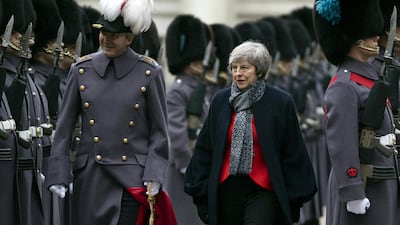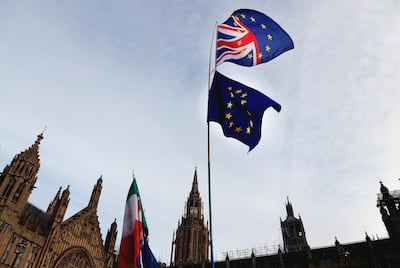If the Martians were to land in Britain today and ask to be taken to our leader, I would have no idea who that is. A few centuries ago, it might have been a king or queen. In recent times, it's been more commonly assumed to be the prime minister. But as we await Britain's crucial parliamentary vote on Tuesday, our prime minister is a leader in name alone.
For Theresa May is in office without being in power. Weakened, wounded, derided and desperate, she might even be out of office by the time the vote takes place.
Her position is so uncertain, she cannot rely on her supposed friends and colleagues in the British government.
Most pundits and politicians assume she will lose the Brexit vote and foresee worse humiliations ahead.
Such is her desperation that Mrs May has put in calls to generally hostile trade union leaders, despite having largely ignored the unions throughout her political career.
At the last minute she is now trying to influence some waverers in the opposition Labour Party to back her Brexit deal but all this merely highlights her failed leadership since taking office in 2016.
Back then, Mrs May commanded a majority in the House of Commons. She seemed like a no-nonsense head teacher who might get things done.
If she had wanted to build support for her Brexit negotiations, a wise politician would, from a position of strength back then, have tried to work with her opponents. But Mrs May arrogantly refused to do so.
Now a diminished and forlorn figure, Theresa May has gone cap in hand to the European Union for concessions, the trade unions and other opponents for support, and supposed allies for loyalty. In each case, she has been rebuffed.
MP Ian Paisley, of the Northern Irish Democratic Unionist Party whose coalition is keeping the Conservative-led government in power, said Mrs May had been given “precise instructions” by his party on how to proceed. The parliamentary tail is now wagging the government dog.
The good news is that in terms of leadership, there is plenty of talent in the House of Commons. Independent-minded MPs from all parties are taking back control. Parliament is doing what it is supposed to do and inflicting on Mrs May a series of procedural and symbolic defeats. These seem technical but are profoundly important.
Most significant is a decision by the Speaker of the House of Commons, John Bercow, to make a controversial ruling which could, in effect, wreck Mrs May’s strategy of dragging out the Brexit agony until an increasingly bitter end on March 29.
For centuries, Parliament in Westminster has battled and confronted the executive, sometimes taking power away from a monarch and now taking to task a failing prime minister.
A Martian landing in Britain today would find the prime minister so diminished that her government colleagues are distancing themselves from her policies.
One potential candidate to replace Mrs May, Foreign Secretary Jeremy Hunt, noted that Parliament will not countenance a no-deal Brexit, while the government which he serves (and which Mrs May supposedly leads), is wasting billions of taxpayers' money on precisely that — preparing for a no-deal exit which is unlikely to happen.
Another potential rival from her own side, Work and Pensions Secretary Amber Rudd, this week reneged on a key element of a Conservative policy to cut welfare benefits. Ms Rudd and Mr Hunt are clearly signalling that on two of the biggest policies trumpeted by Mrs May, the prime minister has got it wrong. A stronger prime minister would intimidate her rivals. Mrs May is neither feared nor particularly respected any more.
Political rows between the executive and legislative branches of government are neither new nor confined to Britain. Donald Trump’s stand-off with Congress over building the Mexican border wall is an obvious parallel.
But Britain is at a turning point. Some of Mrs May's Conservative colleagues have plotted for more than 40 years to pull Britain out of the European Union without thinking through how it might be achieved. Pragmatic politicians from all parties – Conservatives, Labour, Scottish National Party, Greens, Liberal Democrats and others – sense that Brexit is falling apart.
The big unanswered question is what will follow. Will Brexit be buried forever? Will there be a general election or a new referendum? Will Mrs May’s political career survive until March, even as her flagship policies sink beneath the waves?
On the popular BBC TV programme Question Time, the audience were asked if they had sympathy for Mrs May. A woman indignantly replied that the prime minister was a “disgrace” responsible for the “mess we are in”, without a chance or plan of leading a “hopeless government who cannot get it together”.
Anyone seeking our leader might have to wait until Britain decides whether to follow the one it’s got.
Gavin Esler is an author, journalist and television presenter



